|
|
|
Sort Order |
|
|
|
Items / Page
|
|
|
|
|
|
|
| Srl | Item |
| 1 |
ID:
110876


|
|
|
|
|
| Publication |
2012.
|
| Summary/Abstract |
Reacting to Iraq's invasion and annexation of Kuwait, two European states, the United Kingdom and France, contributed large forces and participated in land, air, and sea operations. The contributions of these states varied considerably in their composition and role. The United Kingdom deployed as many forces (45,000 personnel) as the country could manage, while France sent a significant force (15,000) that fell short of its potential. Once in Arabia, the British played a major role in coalition planning, while the French remained operationally aloof. Finally, when it came to launch offensive operations, British forces were central to the coalition's riskiest endeavors, such as special forces raids and preparing a fake amphibious invasion, while French forces played a credible, but less dangerous role. This article tests the ability of realism and historic institutionalism to explain these different responses to the 1990-91 Gulf Crisis. Although realism appears a priori to possess a high degree of explanatory power, a detailed process tracing analysis reveals that historical institutionalism can better account for the different outcomes observed.
|
|
|
|
|
|
|
|
|
|
|
|
|
|
|
|
| 2 |
ID:
116133
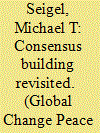

|
|
|
|
|
| Publication |
2012.
|
| Summary/Abstract |
This paper is a summation of material drawn from 18 papers written by Professor Toshio Kuwako of the Tokyo Institute of Technology. The purpose of the paper is to present an overview of Kuwako's approach to consensus building and make it available to the English-speaking world. The papers written by Professor Kuwako are largely experiential accounts with reflection on and analysis of that experience. The organization given to the present paper is that of the present writer. Given that doubts are sometimes raised about consensus building in regard to intractable issues where no agreement seems possible, and that it is precisely these kinds of issues that are the focus of Kuwako's work, his contribution would seem important.
|
|
|
|
|
|
|
|
|
|
|
|
|
|
|
|
| 3 |
ID:
091915
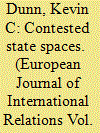

|
|
|
|
|
| Publication |
2009.
|
| Summary/Abstract |
Since the 'linguistic turn' in International Relations, it is assumed that agents like the state are always effects of discourse and should be 'decentered' rather than made the starting point for theory. Yet, most postmodern IR scholarship implicitly assumes a particular conception of the state. This article provides an explicit elaboration of that conceptualization, positing that the state is a discursively produced structural/structuring effect that relies on constant acts of performativity to call it into being. The constituting discourses on the state are never complete or closed, but are always contested, offering spaces for maneuver and resistance. Employing the example of African national parks, this article examines 'contested state spaces', those places where officially sanctioned state-making practices are successfully challenged, resisted and replaced by alternatives. The example of African national parks provides a useful way of interrogating state-making practices in the everyday life of international relations.
|
|
|
|
|
|
|
|
|
|
|
|
|
|
|
|
| 4 |
ID:
107141


|
|
|
|
|
| Summary/Abstract |
Difference in values not a decisive factor in conflicts between states
Recently, Dr. Stefan Halper of the university of Cambridge published an article questioning former US assistant secretary of defence Joseph Nye's view that ' China's rise doesn't mean war." Halper holds that the diplomatic, political, and economic values China advances are antithetical to those that formed that status quo global architecture. The author responds that difference in values is not a major4 contributing factor of conflict between major powers and China's fast development is an opportunity, not a challenge, for the west.
|
|
|
|
|
|
|
|
|
|
|
|
|
|
|
|
| 5 |
ID:
172305
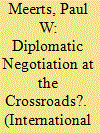

|
|
|
|
|
| Summary/Abstract |
While interstate negotiation is becoming more important than ever in guiding the course of world affairs, it is in danger of being weakened as a consequence of the erosion of multilateral diplomacy. Multilateral organizations and cooperation between states has opened new pathways for negotiation, stabilized the world, and served to equalize power distribution. Growing multilateralism has protected negotiation processes and offered smaller powers more of a say in world affairs. However, with the current trend for powerful countries to undermine multilateral negotiation processes in favor of bilateral and minilateral power-based negotiations, global political gaps are widening. This will undermine small countries and middle powers that want to use diplomatic negotiation as their main tool to influence others. The consequence could be a process of diplomatic negotiation used by hegemonic powers to further their interests to the detriment of the less powerful.
|
|
|
|
|
|
|
|
|
|
|
|
|
|
|
|
| 6 |
ID:
143205
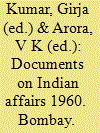

|
|
|
|
|
| Publication |
Bombay, Asia Publishing House, 1965.
|
| Description |
xxii, 636p.hbk
|
|
|
|
|
|
|
|
|
|
|
|
Copies: C:1/I:0,R:1,Q:0
Circulation
| Accession# | Call# | Current Location | Status | Policy | Location |
| 000390 | 025.954042/KUM 000390 | Main | On Shelf | Reference books | |
|
|
|
|
| 7 |
ID:
144265
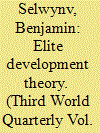

|
|
|
|
|
| Summary/Abstract |
Much development theory is based upon elite-led conceptions of social change. Elite development theory (EDT) conceptualises ‘the poor’ as human inputs into or, at best, junior partners within elite-led development processes. This elitism contributes to the continual (re)framing of the poor as passive beneficiaries of elite policy, and legitimates economic exploitation of the poor. These claims are illustrated by discussing a number of EDT traditions – the Washington/Post-Washington Consensus, statist political economy, modernisation Marxism and varieties of pro-poor growth. As an alternative to EDT the article argues for a conception and practice of ‘labour-centred development’.
|
|
|
|
|
|
|
|
|
|
|
|
|
|
|
|
| 8 |
ID:
146588
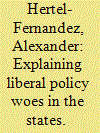

|
|
|
| 9 |
ID:
077330
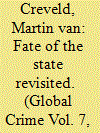

|
|
|
|
|
| Publication |
2006.
|
| Summary/Abstract |
The State, which during the three and a half centuries since the Treaty of Westphalia (1648) has been the most important and the most characteristic of all modern institutions, appears to be declining or dying. In many places, existing states are either combining into larger communities or falling apart; in many places, organizations that are not states are challenging them by means fair or foul. On the international level, we seem to be moving away form a system of separate, sovereign, legally equal, states towards less distinct, more hierarchical, and in many ways more complex political structures. Inside their borders, it seems that many states will soon no longer be able to protect the political, military, economic, social and cultural life of their citizens. These developments are likely to lead to upheavals as profound as those that took humanity out of the middle ages and into the modern world. Whether the direction of change is desirable, as some hope, or undesirable, as others fear, remains to be seen.
|
|
|
|
|
|
|
|
|
|
|
|
|
|
|
|
| 10 |
ID:
101834
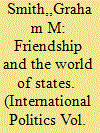

|
|
|
|
|
| Publication |
2011.
|
| Summary/Abstract |
What contribution can a theorization of friendship offer to the understanding of the world of states? It is argued here that the contemporary view of friendship eclipses a longer and broader appreciation. As such, the view of friendship that identifies it as affective, private and particular (here termed the contemporary-affective view) is one instance of a much wider cluster of ideas sharing overlapping characteristics. So conceptualized, 'friendship' is the concern with what binds person-to-person. It is a concern with the nature and fabric of the political. Seen from this vantage point, friendship highlights what an analysis through the state tends to overshadow: the enduring affinities, identifications and bonds that permeate the dynamics of the world of states. Thus, friendship need not remain the preserve of the premodern (Aristotle), nor be usurped as an adjunct to sovereignty and power (Schmitt), but investigated as an ongoing site of analysis for phenomena within, between and beyond states.
|
|
|
|
|
|
|
|
|
|
|
|
|
|
|
|
| 11 |
ID:
114994
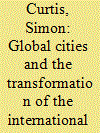

|
|
|
|
|
| Publication |
2011.
|
| Summary/Abstract |
The emergence of a new urban form, the global city, has attracted little attention from International Relations (IR) scholars, despite the fact that much progress has been made in conceptualising and mapping global cities and their networks in other fields. This article argues that global cities pose fundamental questions for IR theorists about the nature of their subject matter, and shows how consideration of the historical relationship between cities and states can illuminate the changing nature of the international system. It highlights how global cities are essential to processes of globalisation, providing a material and infrastructural backbone for global flows, and a set of physical sites that facilitate command and control functions for a decentralised global economy. It goes on to argue that the rise of the global city challenges IR scholars to consider how many of the assumptions that the discipline makes about the modern international system are being destabilised, as important processes deterritorialise at the national level and are reconstituted at different scales.
|
|
|
|
|
|
|
|
|
|
|
|
|
|
|
|
| 12 |
ID:
118234
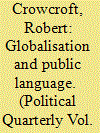

|
|
|
|
|
| Publication |
2012.
|
| Summary/Abstract |
This article questions what the concept of 'globalisation' really amounts to. In doing so it highlights problems for the ascendancy of globalisation in contemporary public debate. Globalisation has become a catch-all; the phrase is now used to try and explain all manner of phenomena from everyday life to international politics. But the article suggests that this may be little more than a combination of rhetoric and wishful thinking. It asserts that the contemporary world is being driven by older and familiar pressures, such as state power and nationalism. As a result, the idea of 'globalisation' needs to be treated with some scepticism.
|
|
|
|
|
|
|
|
|
|
|
|
|
|
|
|
| 13 |
ID:
177687
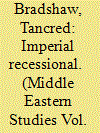

|
|
|
|
|
| Summary/Abstract |
The British imperial project in the Bahrain, Qatar and the Trucial States originated in the early nineteenth century when the Government of India signed treaties with the rulers of the sheikhdoms. It was a model of low-cost imperialism in which the British secured their economic and strategic interests. Whitehall rarely intervened until the Labour Party came to power in 1964. Domestic economic and political considerations led Harold Wilson to announce in January 1968 that the British would withdraw from the Gulf by the end of 1971. This decision was devoid of any strategic rationale, and was regarded with dismay by the rulers of the sheikhdoms. The rulers were responsible for establishing a political structure, and until the summer of 1970 the Foreign Office left them to their own devices. The election of the Conservative government in June 1970 led to a fundamental re-evaluation of the Foreign Office’s policy and Sir William Luce was appointed to establish a viable political structure for the sheikhdoms. Against the odds, Luce and the Foreign Office played a key role in creating the United Arab Emirates. Bahrain and Qatar became independent states.
|
|
|
|
|
|
|
|
|
|
|
|
|
|
|
|
| 14 |
ID:
152333
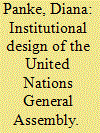

|
|
|
|
|
| Summary/Abstract |
Most international organizations are based on the principle of equality of states. Their institutional design grants all member states the same formal rights. Although formally equal, states differ immensely concerning their power capacities and size. Can institutional designs of international organizations mitigate real-world power- and size-related differences between member states, and if so, to which extent? To provide an answer, this article focuses on the United Nations General Assembly, which combines an equalizing institutional design with a large very heterogeneous membership. It shows that the strength of the equalizing effect varies across stages of the policy cycle. It is the weakest in the negotiation stage and the strongest in the final decision-making stage, while institutional design of international organizations has a de facto equalizing effect of medium strength in the agenda setting stage. Thus, while power and capacity differences matter, larger powerful states are not systematically better off throughout the entire policy cycle.
|
|
|
|
|
|
|
|
|
|
|
|
|
|
|
|
| 15 |
ID:
120013
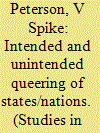

|
|
|
| 16 |
ID:
116066
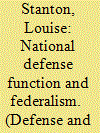

|
|
|
|
|
| Publication |
2012.
|
| Summary/Abstract |
Countries with a federalist system of government have different arrangements for providing national security. US national security is provided by national and State defense forces. The quintessential national function - national defense - experienced some changes that enhanced the role of the States. Policy changes in the National Defense Authorization Act of 2008 (2008 NDAA) introduced new roles for the Governors and the State defense forces, or the National Guard. This article explores how the interests of Congress and States aligned in the 2008 NDAA such that the national defense function changed. This article finds that the national government continues to have the central coordinating role, but that the politics and provisions of the 2008 NDAA changed the national-State relationship in mission, decision-making, and command and control so that US federalism in the national defense function is evolving in unexpected ways.
|
|
|
|
|
|
|
|
|
|
|
|
|
|
|
|
| 17 |
ID:
075750
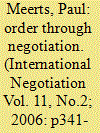

|
|
|
|
|
| Publication |
2006.
|
| Summary/Abstract |
The negotiation process can be a tool that generates order in international relations between states and international organizations. Order and structure are needed in a globalizing world of interdependencies and growing cleavages. The importance of international regimes in channeling and protecting negotiation processes is discussed. Regimes and interstate bargaining can only be effective if the main actors successfully balance their interests and activities. To create this equilibrium, extra-regime negotiations are as much needed as intra-regime bargaining, since negotiation is as much about situations as it is about structures, flexibility plus strength.
|
|
|
|
|
|
|
|
|
|
|
|
|
|
|
|
| 18 |
ID:
152330
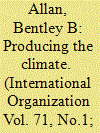

|
|
|
|
|
| Summary/Abstract |
This paper argues that the climate came to take on a geophysical rather than a bioecological form in global governance because it emerged from a dynamic, interactive process between states and scientists. In the 1950s, state agencies, especially elements of the US military, steered and accelerated the development of the geophysical sciences, which set the discursive frame within which climate politics now plays out. In the 1990s, scientists and IO experts responded to states' requests to study carbon sinks by expanding the climate to include new greenhouse gases and land-use practices. Drawing on Science and Technology Studies as well as discursive theories of global governance, I theorize object constitution as a process of co-production in which states steer the development of scientific knowledge and scientists assemble epistemic objects. This contingent interaction of political and scientific actors shapes the form and content of global governance objects. The argument extends and challenges the epistemic communities literature and theories of the global governance life cycle that focus on how problems end up on the agenda of states rather than the processes of problem construction.
|
|
|
|
|
|
|
|
|
|
|
|
|
|
|
|
| 19 |
ID:
143242
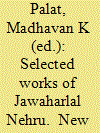

|
|
|
|
|
| Publication |
New Delhi, JawaharLal Nehru Memorial Fund, 2015.
|
| Description |
xxix, 749p.: ill.hbk
|
| Series |
Second Series
|
| Contents |
Vol.XLIII (63): 1 September - 31 October 1960
|
| Standard Number |
9780199465903
|
|
|
|
|
|
|
|
|
|
|
|
Copies: C:1/I:0,R:0,Q:0
Circulation
| Accession# | Call# | Current Location | Status | Policy | Location |
| 058461 | 954.042/PAL 058461 | Main | On Shelf | General | |
|
|
|
|
| 20 |
ID:
143243
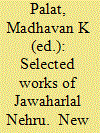

|
|
|
|
|
| Publication |
New Delhi, JawaharLal Nehru Memorial Fund, 2015.
|
| Description |
xxvi, 602p.: ill.hbk
|
| Series |
Second Series
|
| Contents |
Vol. XLIV (64): 1 - 30 November 1960
|
| Standard Number |
9780199465910
|
|
|
|
|
|
|
|
|
|
|
|
Copies: C:1/I:0,R:0,Q:0
Circulation
| Accession# | Call# | Current Location | Status | Policy | Location |
| 058462 | 954.042/PAL 058462 | Main | On Shelf | General | |
|
|
|
|
|
|
|
|
|